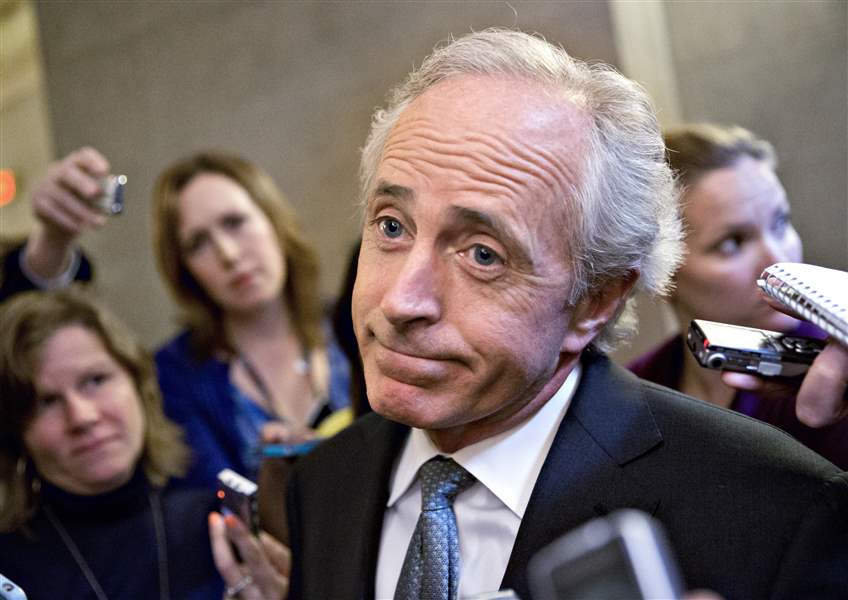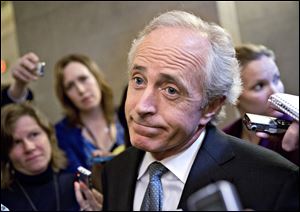
COMMENTARY
GOP fractures surface explosively in Corker’s critique of Trump
10/13/2017

In part of a Twitter back-and-forth with President Donald Trump, Republican Sen. Bob Corker likened Trump's White House to an "adult day care."
ASSOCIATED PRESS
WASHINGTON — The Republicans control the White House and both houses of Congress. And yet ...
And yet Sen. Robert Corker, the Republican chairman of the Senate Foreign Relations Committee, described the GOP White House as an “adult day-care center.”

In part of a Twitter back-and-forth with President Donald Trump, Republican Sen. Bob Corker likened Trump's White House to an "adult day care."
And yet the Republican president is at war with the Republican leader of the Senate and now is consorting with the Democrats to produce a health care overhaul his Republican allies could not pass in three tries.
And yet the business interests who customarily line up with Republicans are describing the efforts of the Trump Administration to reshape NAFTA as “highly dangerous.”
All those and-yets prompt a serious question that is unspoken and yet unavoidable in the Trump era:
Are the Republicans even a party anymore?
A similar question might be asked of the Democrats, as increasing numbers of independent activist groups push the world’s oldest political party to the left. But parties out of power customarily engage in introspection, a role Democrats perfected in the 1980s when the gravitational pull was to the center rather than leftward. The Democrats’ struggle to redefine themselves in the wake of a humiliating defeat is notable but, in historical terms, unremarkable.
It is the struggle inside the Republican Party that is the more unusual, the more compelling and almost certainly the more consequential, for perhaps never in modern American history has a party so well situated on paper been so fragmented in reality.
Republicans now control twice as many chambers as do Democrats in state legislatures across the country, and they hold two-thirds of the governors’ chairs, a breathtaking and potentially significant dominance. The Republicans’ majority in the Senate is small, but they have Vice President Mike Pence at the ready to break a tie. In the House, the Republican majority is the largest since the administration of Calvin Coolidge.
Indeed, it is instructive to look at the presidency of Coolidge — a former governor of Massachusetts — as a way of understanding the deep peril that envelops the Republicans today.
In those years, nearly a century ago, the Republican in the White House and the Republicans in the Congress stood for morality, frugality, and stability. There were few if any strains between the executive and legislative branches. Coolidge seldom spoke, believing that “I have never been hurt by what I have not said.”

Shribman
The divide between the Republican White House and the Republican Congress is wider than the divide between Richard Nixon’s Republican White House and the Democratic Congress before Watergate — and that’s without forgetting that contempt for Nixon was rampant among Democrats since his first congressional campaign, in 1946.
Together the Nixon White House and the Democratic Congress passed environmental, workplace-safety, and progressive-tax bills. Democrats in Congress may have loathed Nixon for his 1950s Red-baiting and his treacly personality traits, but much landmark legislation can be traced to the first Nixon term. And though it was a delegation of Republicans who prevailed on Nixon to resign in 1974, the principal divisions within the party were about the war in Vietnam and insignificant politically: Rep. Pete McCloskey of California mounted a quixotic primary challenge against the president in 1972, and though he won 20 percent in the New Hampshire primary, he soon faded from contention.
“The Republican Party when Nixon was in office was unified,” said John R. Price, a domestic-policy aide in Nixon’s early White House years. “He was basically a centrist who managed to keep the party together — until Watergate. The Republicans felt, in fact, great delight in having the presidency back after Kennedy and Johnson.”
Republicans are delighted in having the White House back after two Barack Obama terms, too, though it might be more accurate to say that they are more delighted that Mr. Obama is not president than they are that Mr. Trump is. They have rebuffed Mr. Trump every time the issue of health care has reached the Senate floor and, according to the latest PBS News Hour/Marist Poll, two-thirds of Republicans now oppose how their party has addressed the issue, a significant increase in recent months.
On Sunday, the President goaded Mr. Corker by suggesting the senator “didn’t have the guts” to run for re-election next year, prompting Mr. Corker, not known as a hothead, to provide one of the more unforgettable ripostes of the Trump years: “It’s a shame the White House has become an adult day-care center. Someone obviously missed their shift this morning.”
Fighting words, to be sure. But indicative of a larger fight, one with large implications.
David Shribman is executive editor of the Pittsburgh Post-Gazette. Contact him at:dshribman@post-gazette.com.